The Open Data Day 2022 is coming soon – let's learn more about the previous ones in Brazil
The Open Data Day is soon going to happen
again. It is scheduled for March 5th of 2022. This will be the tenth
thirteenth time that ODD happens in Brazil, so this is a good opportunity
to get to know more about it and how these events have been happening in
Brazil for the past 9 12 years.
Q: Wait, you said it’s the tenth Open Data Day, but I read somewhere else that it’s the twelfth.
A: You are right. I’m considering here the ones taking place in Brazil only. Read on to find out more or jump to the early history section for further details.
UPDATE: This is actually the thirteenth time the ODD happens in Brazil. More on that in the early history section.
The Open Data Day is a world-wide group of events, each organized locally, to celebrate open data and to collaborate on common goals, often with computer code, while using open data. Anyone can prepare their local event. Local usually means a city, but often there are more than one event in the same city. For example, in 2020 there were two Open Data Day events in the city of Rio de Janeiro.
What motivated me to look up and write about the history of Open Data Day in Brazil was an invitation by the National Archives to speak in their Open Data Day Rio de Janeiro 2020 event. I decided to talk there about the Open Data Day itself: what it is, why is it important, and how have some previous ODD events been like.
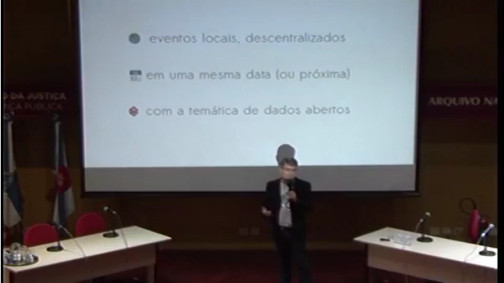
If you are curious, the recordings of the talk (in fact of the whole event, in Portuguese language) is available on Youtube. The slides are on SlideShare. I have also written another entire blog post recounting what happened in that event.
Events going online
The coronavirus pandemic since March 2020 has completely changed the way these events are handled. So, to understand on how they are done, requires us to consider separately the pre- and post-Covid periods. The most notable difference is that, like everything else, almost all events used to be for in-person attendance. Nowadays, almost everywhere they happen exclusively online.
In the hope that it will be useful to people whenever in-person events are safe to do again, we’ve decided to keep here references to guides on organizing both kinds of events – in-person or online.
For in-person events, a good reference could be the Guide for the Open Data Day 2020 that the Embaixadoras program of Open Knowledge Brasil had produced, as a result of the discussions taken during a webinar, in which I took part in January 2020. A recording of that webinar, in Portuguese language, is available on Youtube.
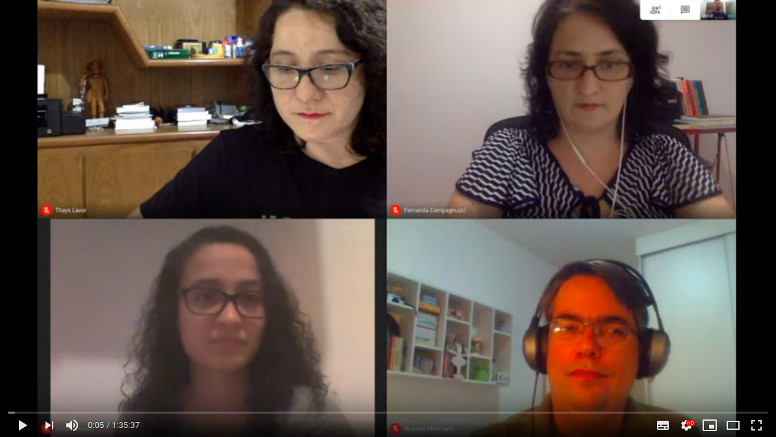
To illustrate some of the challenges involved in moving from an in-person event to an online one, we can look at this post. It includes some lessons learned in the process the csv,conf,v5 organizing team, which includes Lilly Winfree and Jo Barratt.
On the following year, the Open Knowledge Foundation published a detailed report on the Open Data Day 2021 for the mini-grant sponsors. It also issued a survey to hear the community on what they wanted for the Open Data Day, and published the results.
In 2022, the Portuguese language guide is being updated by Open Knowledge Brasil for 2022. The main difference is that it now includes advice for organizing events online, as has been the norm since the Covid pandemic started in 2020. Many of the ideas and advice remain the same, though, and could be useful for creating Open Data Day events no matter if it is in-person or online.
UPDATE: there is now also a blog post by Juliana Trevine and Ariane Alves in the Open Knowledge Brasil blog with the updated advice.
What is the Open Data Day and how to make one
The Open Data Day is a decentralized event, where people in many places around the world gather to celebrate open data and to do activities related to open data. These activities vary a lot. They can be, for instance:
- exploring data sets to get to know the possibilities of using them to solve real world problems;
- talks about any topic related to open data;
- hackathons, data challenges, data analysis or software development in projects that use open data;
- round tables and Q&A sessions between data users and data publishers, scholars, practitioners, students and professionals, anyone interested in data (often within a particular domain of data).
Why is it important?
Why does it matter? Well, it’s an opportunity to get people together to discuss things related to open data. It’s often the case that each one works in their open data related project on their own, and don’t know what the others are doing or how they can benefit from cooperation. It’s not very often that you have a critical mass of people interested in open data who can work together to solve real world problems with data. It is also a great opportunity to expand your network of contacts to more people that are involved in the data use landscape, so many interesting new connections usually happen in those events.
However, the Open Data Day isn’t just for experts in the matter, or even just for technically inclined people. As it’s an inclusive event, people who have never had any contact with open data before can feel welcome and figure out a way to help with something useful and meaningful. And, of course, to learn and practice skills in an environment where it’s easy to get help when you need it, since more experienced people will often will be within reach and willing to help.
Getting started in organizing an event
Since the event is decentralized, you don’t have to ask permission to anyone in order to plan a new one in your community. Just think of a few things to do there, by preparing activities related to a project or two that people might want to volunteer to. Think of a common problem in the local community that could be tackled with data. Or a domain of data that might interest a community of people, even if they’re not situated in the same local area: exploring and/or improving upon a dataset is also a possibility.
It’s often the case that people come over willing to collaborate, but have no idea about what to do. So having some suggestions ready for possible activities is something pretty useful. Having a talk prepared to introduce newcomers to ongoing projects that you intend to work on is also important.
Once you have an idea of what to do, first look at the map on opendataday.org and see if there is already an event being organized in your area. If so, try to reach out to them with your idea – it might just be incorporated in to the event’s programme. You can also start your own event, just make sure to fill in the form, in that case, so that it also shows on the map.
You can also look at the suggested themes there and try to propose an activity around them and apply for a mini-grant. Those are almost always offered every year by sponsors to the Open Data Day.
Note: if your native language is one other than English, see if the opendataday.org website is available and up to date in your language. If not, see the repository on Github and help to translate or update it. That way, you’ll have one less barriers for newcomers to understand and come to the event for the first time. I have been doing so for the Portuguese language in the previous years up to 2021.
The event venue or online tool
Do not do an in-person event if the local sanitary conditions do not allow for it. And even if it is allowed, even with face masks, distancing and all precautions, it is safer for everyone to do it online while the pandemic still goes.
That said, when you are doing in-person event, try finding an institution that would let them use the space for the event. Often there are schools, public buildings or even small business that, when told what the event is about, will let you use the venue free of charge. Especially because the ODD is usually on a Saturday, when some of those institutions won’t be using the space anyway.
In the aforementioned January 2020 webinar, Thays Lavor stated that, in her experience with “Beer with Data” events, it was a good thing to make the event in an open space, so that some people who were just walking by became curious about it and eventually engaged with it and participated in it.
It’s also very important to make sure that the place does have a decent wifi connection for participants to use. It will be frustrating for everyone if they can’t easily download datasets and tools for analysis. Don’t leave these arrangements to the last minute or your event might not happen.
For doing it online, try to choose a tool that will make everyone as comfortable as possible, preferably one that does not require participants to install anything. Give preference to hosted open source solutions, like Jitsi Meet or Big Blue Button, as they don’t often require participants to agree to terms of service that are bad for their privacy.
There are lists of instances of these services around the internet, but I like to look for them at Chatons.org, a list maintained by the French non-profit FramaSoft. There you can find, for example, lists of services that use Jitsi Meet or Big Blue Button. Some of these services are free of charge but their infrastructure cost money. So if you use it, please donate if you can.
If you have any doubt that these tools can handle it, know it that the largest free and open source conference in Europe, FOSDEM 2022, happened this February completely online with over 8,000 participants. Which tool did they use? Matrix, the decentralized, open protocol, completely free and open source communication tool, which embeds Jitsi for video calls. Sure, it had some technical issues, but which proprietary tool doesn’t have them for events as big as this one? In the end, I’d say the event was a resounding success.
Tools that allow people to have avatars that move in a 2D space are also interesting in that they encourage smaller groups to gather together and have a quick (or long) serendipitous conversation in the same corner of the virtual world. Some examples of tools that allow for this are gather.town and WorkAdventure, both of which allow for tools for designing and building your own virtual world, the latter of which is free and open source software (the source and mapping starter kit are on Github). Many online events in the past couple of years have been using this to emulate the feeling of being in an actual place.
In either case, don’t forget to announce the event to all of the relevant groups by direct contact and by using social media. Also make sure it is in the opendataday.org map.
Finding and preparing data
Make sure you introduce the datasets that could be useful for the planned activities and share with everyone the links to those datasets. Look for datasets in the official sources, local and national data portals, government websites and transparency portals, national statistics offices, international organizations (e.g. World Bank, UN, OECD), and corporate open data catalogs (e.g. data.world, Open Corporates). Sometimes there are also useful community curated data catalogs (e.g. The Data Hub, DBPedia or WikiData), so don’t forget to check those too. In case you need geospatial data, don’t forget to check OpenStreetMap, GeoNames, and the national and local geospatial open data portals – when available, those are great sources.
If you don’t know where to start, you can also browse lists of data portals that might be relevant to you at dataportals.org, Open Data Inception, and other community curated lists and data portals that are relevant to your location.
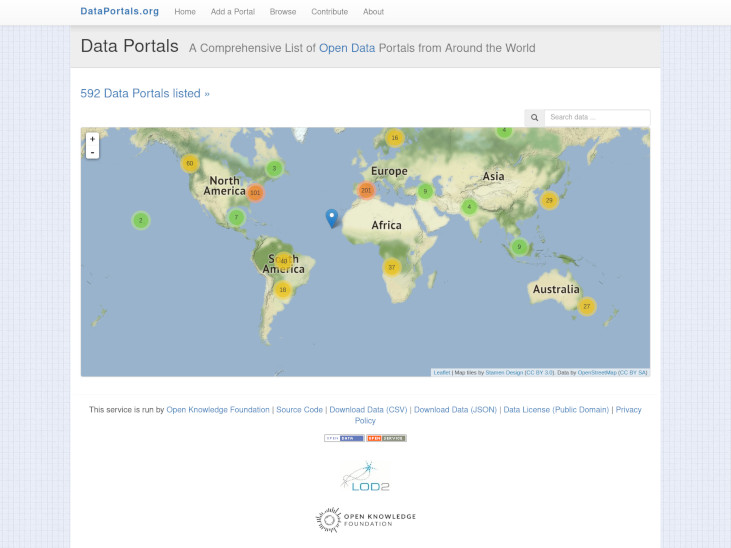
Data from Brazil
For data from Brazil, you may want to check the open data portal of the executive branch of the federal government, dados.gov.br. Check out also the open data portals of other branches and levels of government. Lists of those (in Portuguese language) are available on:
For data from the statistics offices, check out IBGE, IPEA Data and also each of the state level statistics offices.
For geospatial data, see the National Infrastructure for Geospatial Data (INDE).
Some community projects also seek to rework some important Brazilian open datasets and make them available in easier to use packages. See:
Who to invite
Speaking of the datasets, if you are a public official responsible for the publication of datasets or can get in touch with some and invite them, it would be a great addition to the event. No one is in a better position to answer whatever questions the participants might have about the meaning, structure and context of data. That way, you can avoid people getting stuck on roadblocks when implementing their ideas. This will also be beneficial to the data publisher, as they can get very useful feedback directly from data users on how to improve data quality and documentation.
It is also useful to have domain experts participate in the Open Data Day. Send invitations to communities that might be interested in working on the projects you’re planning to do. Not only tech communities, but also ones related to the field of work related to the project. For instance, if it’s an environment related project, get in touch with environment protection groups. If it’s a health or a transportation related issue, do the same.
Find out if are there computer associations in your location, such as hacker spaces, hacker clubs, etc., that have activities related to open data or the use of data. If so, they are often interested in at least participating and helping promote it in social media, if not more. Participants from these groups are usually very qualified and can help in achieving the projects’ goals and getting newcomers on board faster with using data.
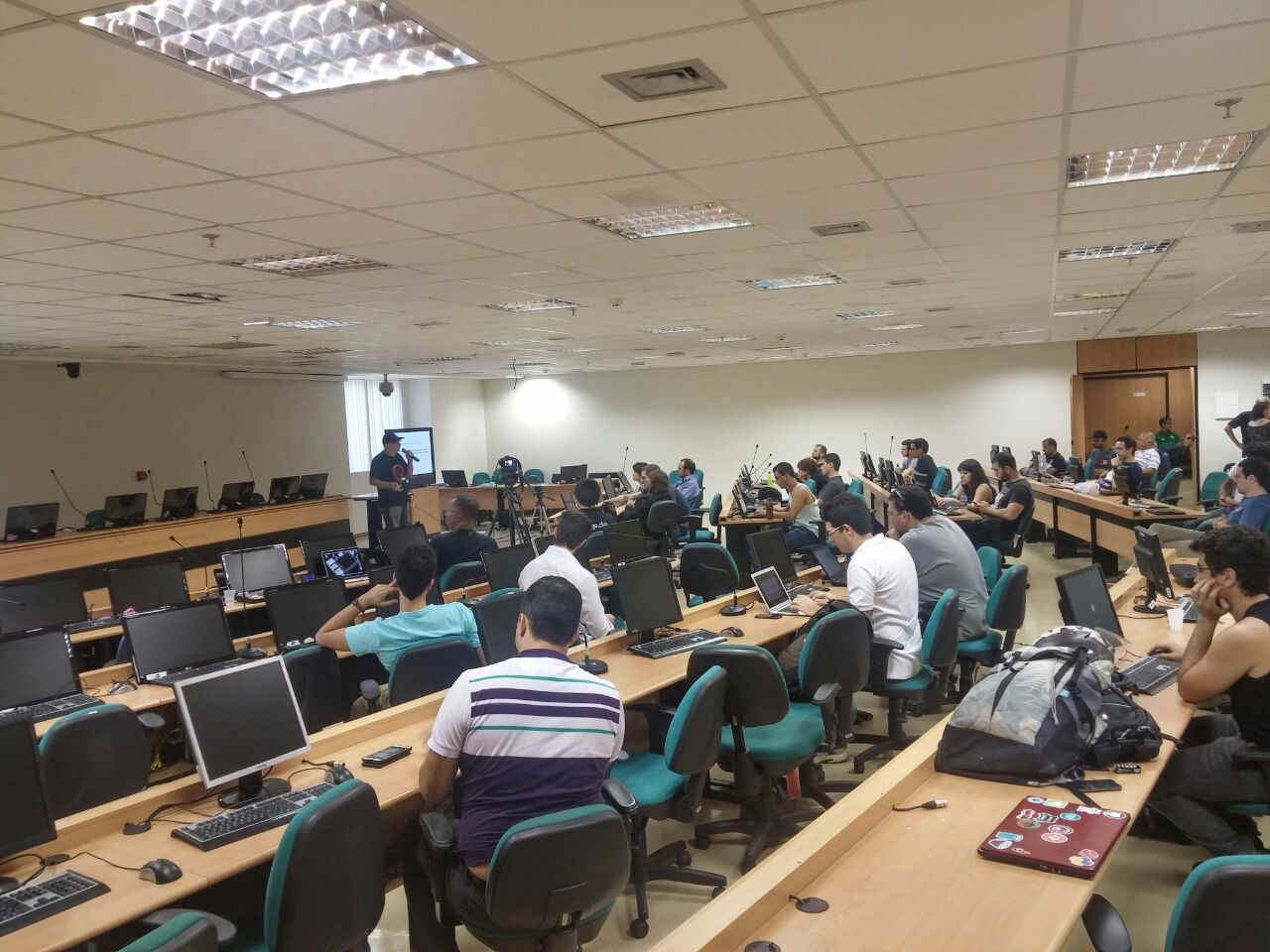
Support and infrastructure
If you can get official support from government or academic institutions, civil society organizations and businesses, that could be useful in many ways. They could sponsor, provide or improve upon the infrastructure of the event, such as the use of space, equipment or even in just getting the word out about it. Another possibility of support is to apply for the mini grants offered each year by the Open Knowledge Foundation and other partners and use those funds.
Another possibility is to open up space in the event schedule and encourage participants to communicate over the internet with another Open Data Day event in another city. Since events happen on the same day, this is often possible and will cross-pollinate ideas between them. There have been some positive experiences with this from the pre-pandemic era of in-person events. To do it in online events would be more challenging, but could perhaps bring interesting results if planned in advance.
Other resources
In 2018, the Open Knowledge Foundation set up an Open Data Day Organizer’s guide (hosted in Google Docs) that should be useful for anyone thinking about organizing their own local event.
In order to adapt the event to an online only format, check out, if you haven’t already, the aforementioned lessons learned post from the csv,conf,v5 event.
Lastly, take a look at the experiences from previous Open Data Day events. You might get cool ideas of things to do and also get tips from “lessons learned” blog posts, such as the one for 2020 and 2021.
A history of the ODD events in Brazil
As a product of having to talk about the Open Data Day itself, I had to research a bit of the history of the events in Brazil. A big challenge in finding out information about ODD events lies in the fact that it consists in a number of decentralized events organized by local groups. Quite often, as soon as just one year after the event, it no longer has a web page online. There used to be a wiki, hosted by Open Knowledge, where most of them were registered, but it has been since shut down. Thankfully, the Web Archive Wayback Machine has a copy of some of those pages.
Another source of information is the Open Data Day dataset, which has everything that used to be shown on the map in the website. Even though most of the time those links are long gone, sometimes the content can also be found in the Web Archive. Because webpages tend to disappear after three years or less, I cannot overstate the importance of the Internet Archive for anyone researching for digital evidence of past events on the web.
Early history
The ODD debuted worldwide in 2010, with many participating cities around the world. Records of those early events are very hard to find in today’s internet. In a previous version of this text I had only mentioned a reference I had found for ODD 2010, but not any in Brazil.
After originally publishing the post, David Eaves, one of the founders of the idea of creating the Open Data Day, reached out to me to say that Brazil has been involved and hosting ODD events since the very beginning. He pointed me to a blog post of his where he proposed creating an international, decentralized open data hackathon. In it, he detailed how Daniela Silva and Pedro Markun, from Transparência Hacker, were part of the group of people that initially proposed creating such an event.
Searching some references there, I could find a page at an old dead wiki, cached by the Web Archive, that contained references to every single Open Data Day 2010 event. And there you can already see 7 events in Brazil. Curiously, I myself was present at the ODD Brasília 2010, but did not remember it until I saw my name on the list of participants!
Sadly, I could find no online references to ODD 2011 and 2012 in Brazil. If you have one, please send me the link!
After that, the earliest records I could find of the event in Brazil were in 2013: São Paulo, at the House of Digital Culture, and Brasília, at the Auditing and Control Institute.
In 2014, different cities represented the Open Data Day in Brazil: Rio de Janeiro, organized by a group in the Federal University of Rio de Janeiro (UFRJ), Porto Alegre, organized by the Mate Hackers hacker space, and Vitória.
2015 saw the number of events in Brazil be multiplied almost threefold:
- Brasília, organized
by the Calango Hacker Club
- Marcus Chevitarese from the Chamber of Deputies talked about their open data 2.0 project
- I showed three datasets from the Ministry of Planning: federal budget, procurement and federal fund transfers, and the debut of organization-wide open data plans
- Wille Marcel showed some different OpenStreetMap layers for drivers and bike riders
- Porto Alegre, organized by Mate Hackers, a local hacker space, the House of Digital Culture and Poa Digital (there is even a video summary, in Portuguese, on Youtube)
- São Carlos, with round tables about Sigalei
- São Paulo, a hackathon with projects against the water shortage crisis in the city and also to write freedom of information requests to the local government
- Curitiba, organized by Code Across Brazil (which I suppose later became Code for Curitiba)
- Rio de Janeiro, organized by Centro de Referência em Inteligência Empresarial (CRIE)
- Teresina, with a transparency hackathon on Teresina Hacker Clube
- Vila Velha, in the state of Espírito Santo
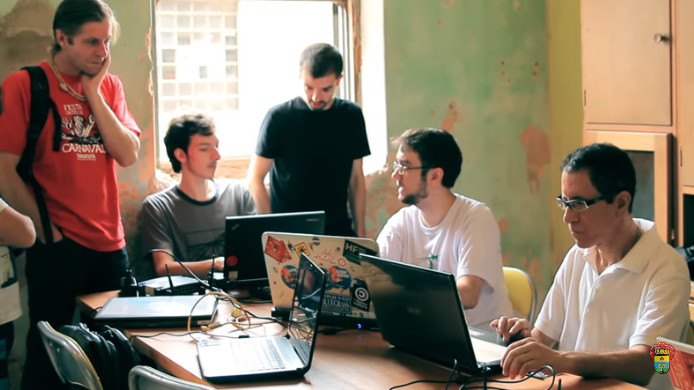
In 2016, there were events in Brasília, Campina Grande, João Pessoa, Maceió and Vitória, as described on this blog post from Open Knowledge Brasil. Not included in the post are the Porto Alegre event, organized by POA Digital, the Rio de Janeiro event, organized by the local chapter of the Open Data Institute, and Teresina, once again organized by Teresina Hacker Club.
2017
In 2017, the Brasília event was organized by Calango Hacker Club and the Ministry of Culture. It had activities related to Operação Serenata de Amor, an initiative to track expenses by members of parliament, Ushahidi, Open Street Map and programming dojos.
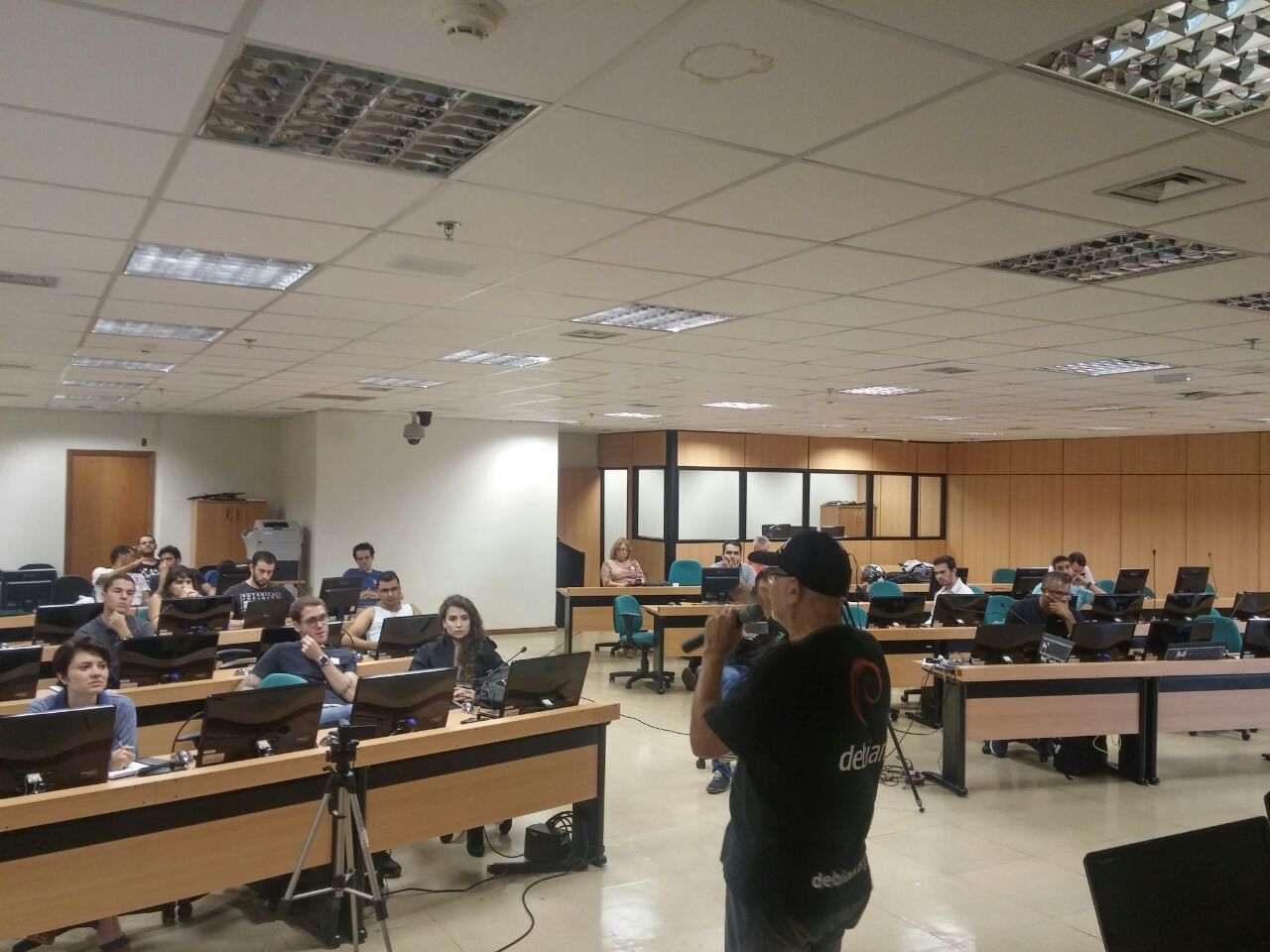
There were also events at Curitiba, Maceió and two in São Paulo. One of them, organized by Open Knowledge Brasil, had activities to develop Querido Diário, a project that aims to eventually be able to scrape all of the official gazettes from Brazilian states and municipalities. The other one was organized by PoliGNU, PoliGen, MariaLab and Transparência Hacker and used open data to discuss the participation of women in public policies.
In Guarulhos, in the state of São Paulo, there were activities promoted by Ônibus Hacker (the Hacker Bus).
2018
The year 2018 got the greatest number of Open Data Event in Brazil yet.
In Brasília, once again we met at the Ministry of Culture. At first, we intended to do some practical programming and data wrangling activities, but we ended up with a round table of conversations where we told the story of how we got the open data policy in Brazil going, starting in 2010, and people got to ask questions about it and about open data in general. The video recording of the event (in Portuguese) is available on Youtube.
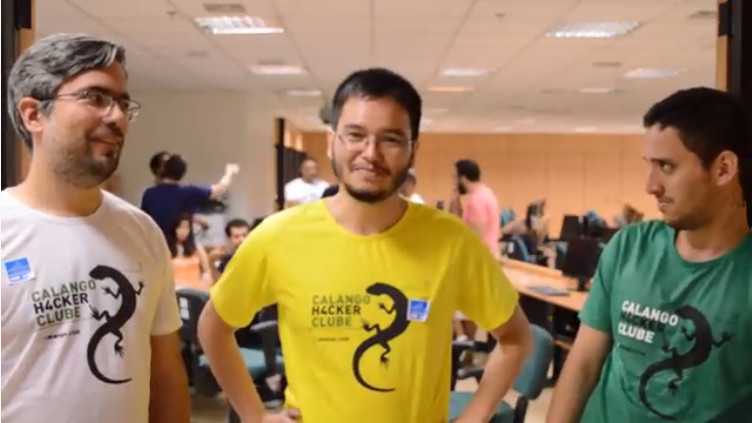
A written account of an important chapter in that story, the collaborative building of the federal government open data portal with civil society using free and open source software, is available at dados.gov.br. If want to know more about it, another part of that story, more focused on the Open Data Steering Committee, is also available on this blog.
The Open Data Day in Maceió started a day early, on Friday, March 2nd, and went on to Saturday. There were round tables of conversation with data users and publishers, an exploration of data on the state of Alagoas’ open data portal and a hackathon.
Porto Alegre had a series of talks and round tables with public officials, auditors from courts of account, data journalists and other activists. A hackathon for civic tools for the then upcoming 2018 election was also planned there.
In São Paulo, Artigo 19, a civil society organization dedicated to promoting human rights, organized a private ODD event at MobiLab, an open innovation lab in the local administration. The activities centered around research data on femicides and how to use that data.
Raul Hacker Club, a local hacker space, hosted one of the ODD in Salvador. There was a data scraping workshop by activist Fernando Masanori and a presentation about Salvador in the Brazilian cities Open Data Index. The other ODD event in Salvador appears to have been hosted by a group in the Federal University of Bahia (UFBA), but I couldn’t find any more information about it.
In addition to those, there were also events at the following cities:
- Curitiba (Movimenta Curitiba)
- Fortaleza (at the Federal University of Ceará)
- Natal (LabGov – UFRN)
- Rio de Janeiro (Rio Criativo)
- São Leopoldo, Rio Grande do Sul (Unisinos university)
Reports of all of the Open Data Day events around the world that have received mini-grants can be found here.
2019
In 2019, for the first time, the Open Data Day in Brazil was split into different dates. Carnival is a major national holiday when most people are unavailable and venues are closed, so hosting an event like this faces major roadblocks. Because of that, some local events decided to go early (March 9th) while others went late (March 23rd). For the first round of events, we had the ODD in four Brazilian cities.
Mapping activities sponsored by one of the mini-grant themes took place in both Curitiba and São Paulo. The latter was an effort organized by Wiki Movimento Brasil to collect structured data about mining dams in Brazil, after the 2019 Vale dam disaster in Brumadinho, and to store them on WikiData. A map of those dams resulting from this mapping effort can be seen here. The former was the 1st Map-a-thon for Urban Accessibility in Curitiba, where 39 occurrences of accessibility problems in the city were mapped by teams of volunteers and made available online on a map. Besides that, ODD Curitiba had sessions on open science, the tracking of public money flows, and mass transit.
ODD Porto Alegre had a series of talks from specialists on the tracking of public expenditures using open data, where each showed their respective projects. There were also talks about open data time series from the national statistics office – IBGE, open data for smart cities, using blockchain technology for transparency, and the use of open data by data journalists.
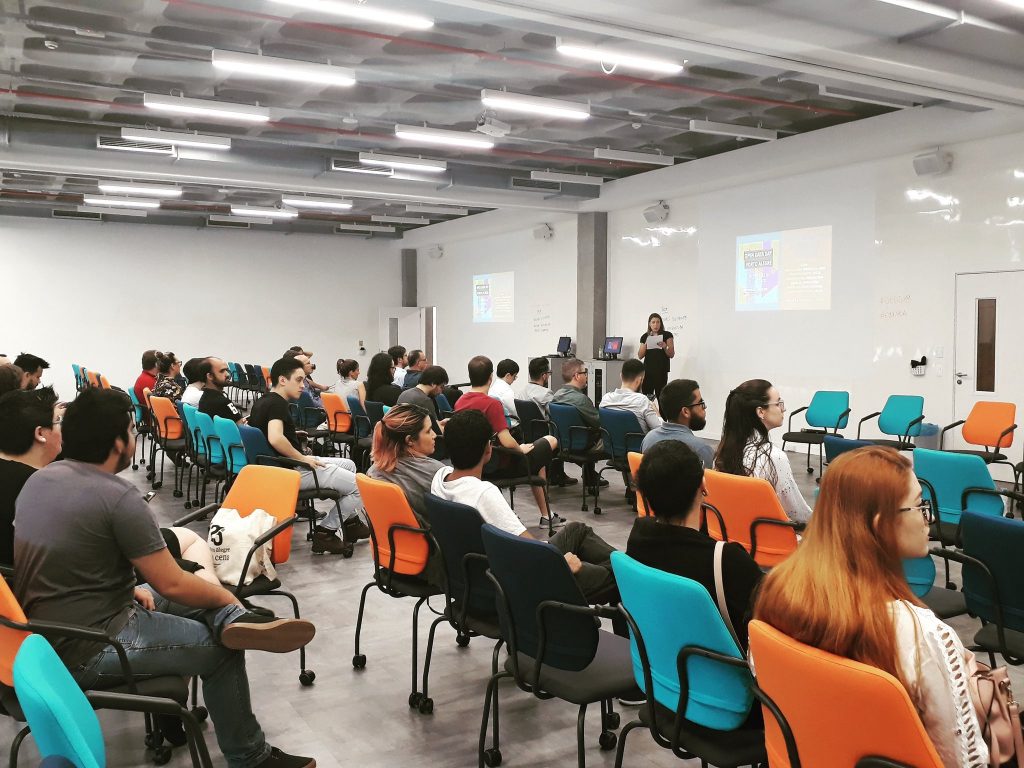
In Recife, the event had talks about local open data portals, research experience on open data of the state of Pernambuco and local civic tech projects.
The Py013 group from Santos, in the state of São Paulo, did some data analysis on March 13th about the ProUni program, which offers stipends and access to universities, and the public expenses of the municipality of Santos, as data made available on the transparency portal of the State Court of Accounts (TCE-SP).
The second round of events, on March 23rd, had a few more cities join the Brazilian Open Data Day: Fortaleza and Natal. The ODD Fortaleza included talks, workshops, webinars and debates. Many of the workshops taught participants how to use the R language: introduction, web scraping, data visualization and more. One of the practical results was to extract data on the expenses done by members of the state parliament. The talks, debates, and webinars discussed public transparency, access to information and civic tech. On the same day, there was an ODD event also at Natal.
2020
In 2020 a new record was set for the Open Data Day in Brazil, with the map on the ODD website registering 15 events at the time. Most of them took place on March 6th and 7th, before the outbreak of Coronavirus had really hit Brazil. Others were a few days late and had to go online in order to avoid the spread of the disease.
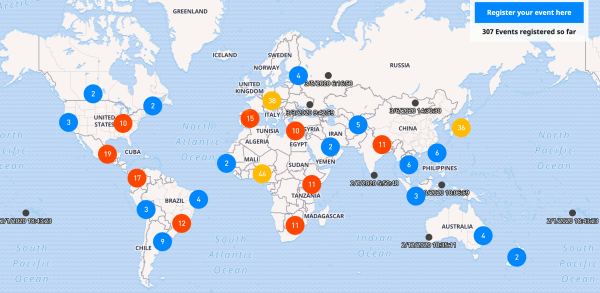
In ODD São Paulo, the talks were about open elections data and parliamentary activity open data. Some of the practical activities involved exploring the API from CEPESP of Fundação Getúlio Vargas with curated data about elections in Brazil, such as the amount of property declared by candidates in the 2018 elections.
Besides the aforementioned ODD event on the premises of Arquivo Nacional on Friday, there was also another ODD event in Rio de Janeiro organized by the Cerveja com Dados (Beer with Data) group, on Saturday. The talks explored various themes such as open data about the local environment, trying to predict school evasion with open education data, and shared bicycles.
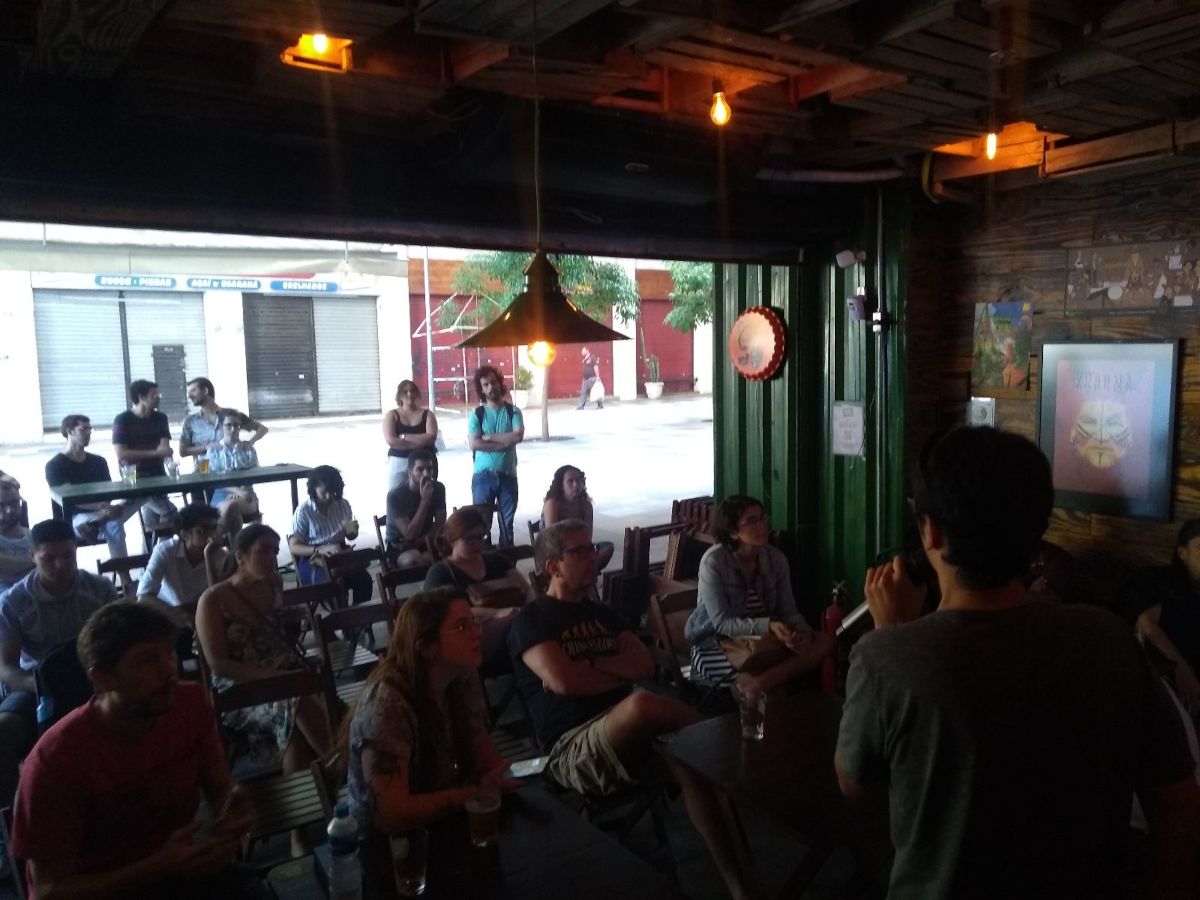
Rio wasn’t the only Brazilian city to have two ODD events in 2020. Recife got two events as well. One of them was organized by IP-rec and the Women in Data Science Recife group, with support by Neurolake, and took place in the morning of March 7th. There were talks about the civic apps Fogo Cruzado and Aetrapp and a debate between a data journalist and a public official, on using open data about violence against women. In the afternoon, the second event was organized by Pernambuco Transparente and supported by Livraria Jaqueira. It had talks on using open data platforms and access to information law, smart, egalitarian and sustainable cities, tracking of public spending, open mapping and data journalism. You can find a detailed account of both events at the Dados Abertos Pernambuco blog post linked above.
Natal had an extensive two day event, filled with talks and even mini-courses:
In total, there were fourteen talks; a video conference directly from Paris; two panels (one about face recognition technologies; and another about open data, ethics and democracy); a mini-course about web data indexing with Python; and a workshop on creating charts with R.
The Manaus Open Data Day had a series of talks on many themes: digital transformation, the new Brazilian data protection law, AI, and the open data ecosystems and business models.
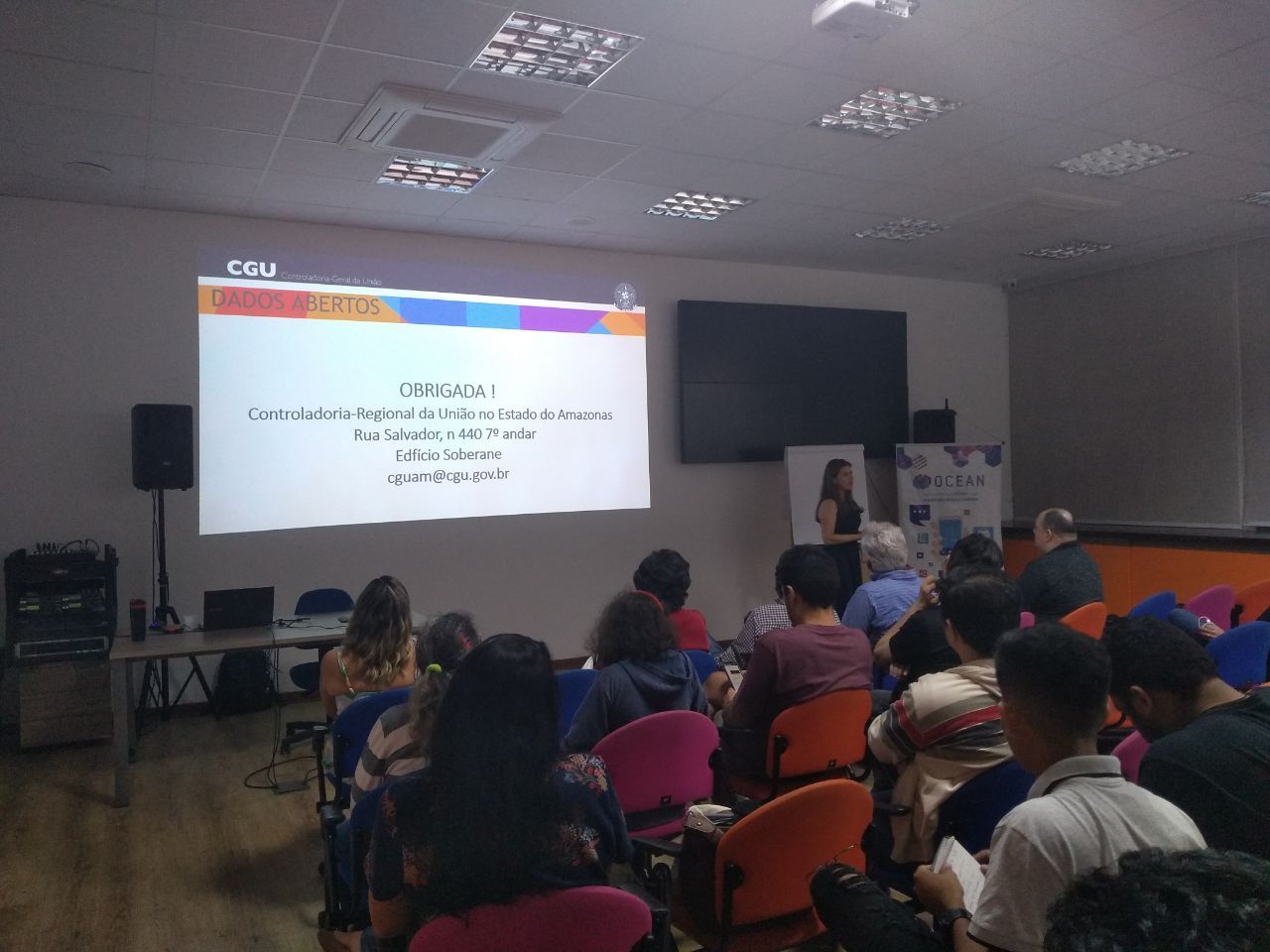
The data protection law as also a theme of the debates in ODD Belo Horizonte, as well as data from the judiciary, information security and the Brazil in Data project.
In Curitiba, the Code for Curitiba group organized a marathon of civic innovation on the theme “Data for Egalitarian Development”. The participating teams coded for two projects:
- Ônibus.IO, a community project to share open data on Curitiba’s public bus system; and
- DS156, an initiative that aims to use the city’s open data on the service call center (which answers by the number 156 in Brazil, similar to number 311 in the United States) and translate it into actionable advice for public officials.
In Campinas, a datathon on using open data about Brazilian municipalities was sponsored by Dextra.
In Santos, the Py013 group organized an ODD event with support by 4Linux, Alura and Casa do Código, in which the participants did some exploratory data analysis using Python and Jupyter Notebooks.
The Porto Alegre event this time dealt with environmental data and discussed the Guaíba mine project and its impact on the Porto Alegre metropolitan area.
One of the late events that went online only due to the new coronavirus pandemic was in Fortaleza, on April 11th. There were practical workshops there that explored open data about the Covid-19 disease and built visualizations.
Another one was in Salvador, organized by the Federal University of Bahia – UFBA. It was initially scheduled to happen on March 7th, but was postponed initially for a week because of strong rainfall in the city. But then all in person activities were suspended a day earlier by the university due to the pandemic. So they rearranged the event to happen completely online on June 10th. There were many lectures, workshops and even artistic shows. Some talks were available in both Portuguese and English languages. The themes were open geospatial data, collaborative mapping and the GeoCombate Covid 19 BA initiative for fighting the coronavirus.
2021
2021 has been the biggest year so far for ODD events in Brazil, with a total of 17 events. Open Knowledge Brasil has published a summary of these events in a blog post, but we are going to take a look at each one of them here as well.
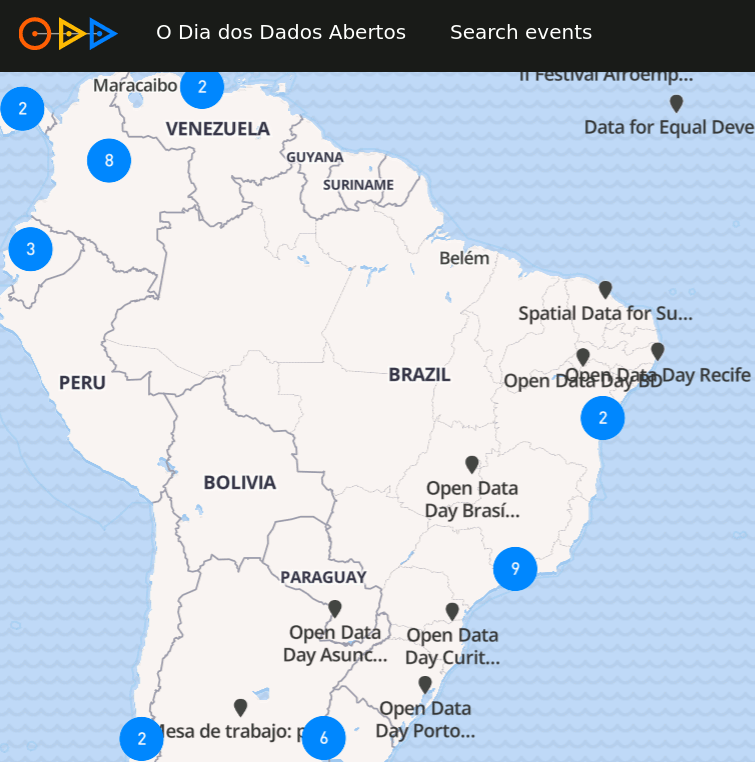
Salvador
Salvador once again had a spacial data and community mapping related ODD event on March 6th, organized by UFBA, the federal university of the state of Bahia. This time it was a minigrant winner. In addition to Open Street Map, data about the Covid-19 disease was in highlight:
Community health workers and family health professionals play a fundamental role for these people, as they are the ones who visit the territory, the homes, recognizing the problems at their origin. To do their job, they often make schematic maps on paper and do not use existing maps. In OpenStreetMap, most of these more precarious areas still do not have their buildings mapped, and this is a layer that can help a lot in the work of these agents. That is why YouthMappers UFBA has been supporting the GeoCombate COVID-19 BA Group and seeking to map the most precarious areas of the City of Salvador.
The event received a mini-grant and the video recording of it is available online.
Feira de Santana
Open Data Feira was an event taking place online, but focusing on open data for the city of Feira de Santana, Bahia, in Brazil. As reported:
Thinking about the local reality, we organised two round tables: the first one about transparency as public policy and the second one about open science. In the first, we discussed the role of transparency in the creation of public policies and its impact on popular participation. We were attended by members of the press, public agencies and activists. A councilman also participated in the panel. In the second we talked about open science, a theme that has become even more relevant during the pandemic of the new coronavirus. We had the presence of researchers from the region and from renowned institutions such as FIOCRUZ.
Besides the round tables, we also organised a hackathon to analyze the city’s data, aiming to encourage the exploration of data that the open data project of Feira has been collecting.
Watch the recording on YouTube.
Rio de Janeiro
In 2021 the National Archives once again hosted an Open Data Day Rio de Janeiro event. It had talks from John Sheridan, from the UK National Archives, and Caroline Burle, from NIC.br, the Brazilian domain name registrar.
The UK National Archives have had a key role in establishing the United Kingdom’s Open Government Licence. Sheridan talked about how open data is expected to have usefulness beyond what was initially thought of when collecting and publishing them.
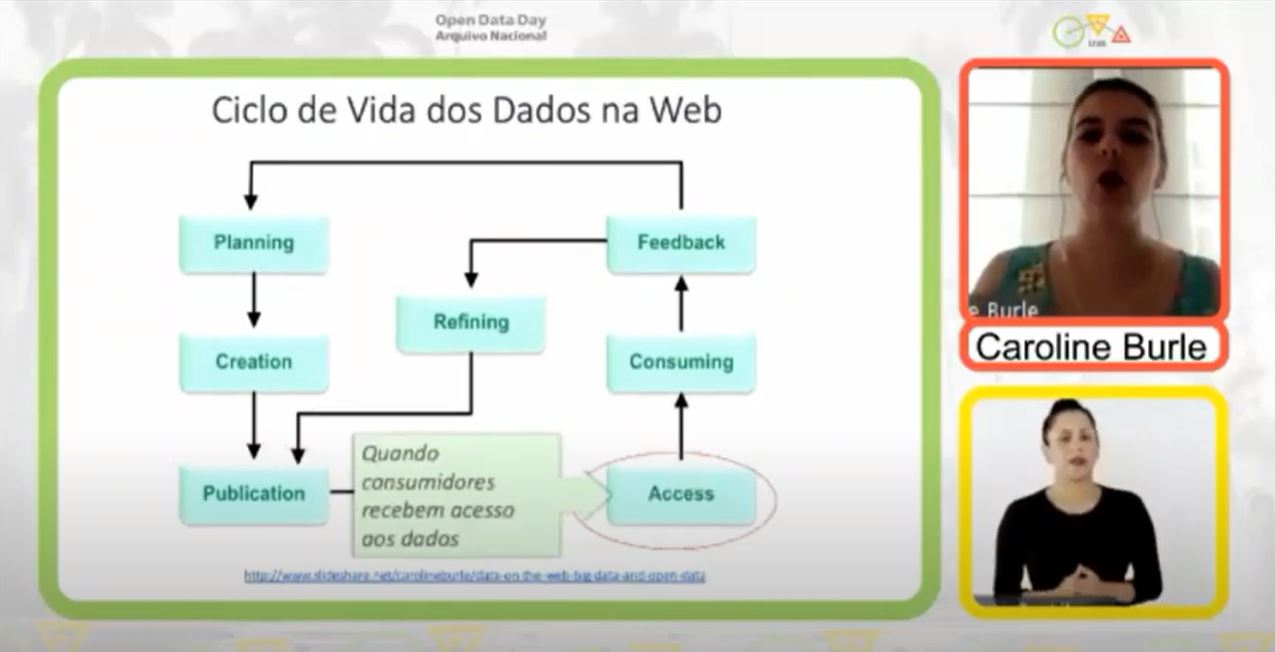
Caroline Burle talked about the data on the web best practices, a document from the World Wide Web Consortium that serves as a framework on how to best make data available on the web.
The recording of the whole event can be watched on YouTube.
Porto Alegre
The city of Porto Alegre had an online event organized by journalists Marília Gehrke and Taís Seibt from Afonte Jornalismo de Dados. The main theme was inspecting public expenditures. Many civil society organizations have participated, such as the Brazilian Investigative Reporting Association (Abraji), Fiquem Sabendo, a data journalism center which uses the Brazilian Access to Information Law to uncover civic issues, Brasil.io an initiative to mirror and facilitate the reuse of open data, and Transparência Brasil. The National Treasury was also there to present the Transparent Treasury data portal.
There was also a presentation from the Open Contracting Partnership, which includes a data standard for open data about government contracts.
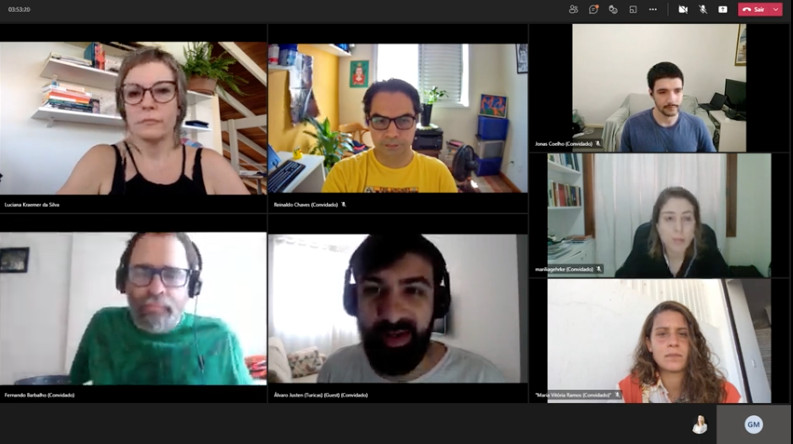
From the report:
The participants have highlighted the importance of demonstrating tools that help in public monitoring. Brazil has one of the highest number of deaths due to Covid-19, and it is paramount to comprehend public databases and contracts to monitor public attitudes to cope with the pandemic. For instance, the panelists have presented information on checking the amount of money spent by the national government in cities and states.
There were also two workshops in the event. Juliana Rodrigues (from Unisinos university) explained concepts about the public budget, which often bewilders whoever tries to dig into this kind of data for the first time. In the other workshop Felipe Soares (from UFRGS university) showed how to use network analysis to comprehend disinformation involving politicians and other public agents.
The recording of the event is on YouTube:
São João del Rei
The Federal University of São João del Rei (UFSJ), in the state of Minas Gerais, and its UAIGeo initiative have organized an online ODD event in 2021 focused on geospatial data, free and open source mapping tools and collaborative efforts such as OpenStreetMap and YouthMappers.
The event was also a recipient of a mini-grant and the report (in Portuguese) is available if you want to find out more.
Belo Horizonte
The innovation lab of the government of the state of Minas Gerais (LAB.mg) promoted an online event.
The purpose of the event is to discuss the importance of promoting open data in the government, bringing successful experiences and good practices in promoting the topic within the public sector.
Apparently it happened on Instagram and there are no further records or details about it available.
Santos
The Py013 group from the city of Santos, São Paulo did some data analysis on vaccinations for measles, rubella and cachumba diseases released by the Observatório das Vacinas (vaccination observatory). The data and code are available on a Github repository.
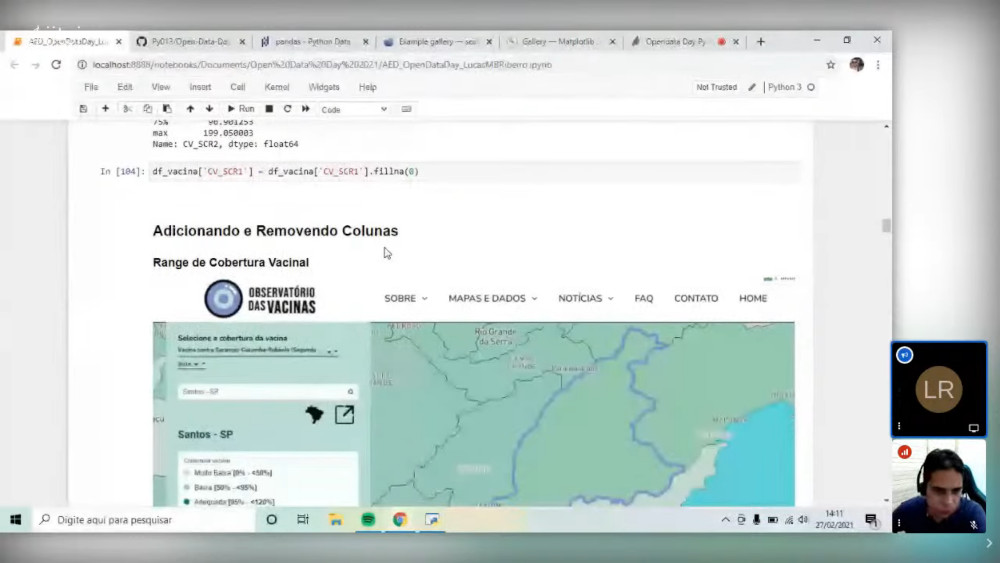
Brasília
Mário Sérgio, former civic innovation manager at Open Knowledge Brasil, organized an online meeting on Discord. One theme discussed with Maria Vitória Ramos, from the Fiquem Sabendo news agency, was the difficulty in accessing local open data on Brazilian municipalities.
Curitiba
Code for Curitiba once again organized an Open Data Day event with almost 8 hours of talks about several different subjects related to open data. The recording of the whole event is available on YouTube.
Recife
The civic innovation ambassadors network of Open Knowledge Brasil and the Women in Data Science Recife group organized the Recife event. There was a workshop on using data from the official gazettes and the Querido Diário (dear diary, or dear gazette) and doing analyses on them. The recording is on YouTube.
Online (no particular city)
Even though many of the city events were held online in 2021 due to the ongoing Covid situation, the following events were also online in Brazil but did not have any connection to any city in particular.
Gênero e Número organized a Brazilian ODD event on the changes in the labor market for women during the pandemic.
During the event, we stressed that all the data we work with is organised, structured, and available on our website. Gênero e Número’s Open Data session (sic) is one of our most visited pages and also contains all the data we use to base all of our stories. We also provided the links to all the databases explored during the event (some from Brazil’s main data provider, IBGE), and showed some of the R scripts used to mine, structure, and analyse the numbers.
This event was also a mini-grant winner. You can watch a video recording of it.
Another online ODD event and mini-grant winner was the II Festival Afroempreendedor. From the report:
We held a three-day event on various aspects of the black population. On the third day we focused on open data. We talked from the basics, about why we are in the data age and how it affects the lives of black people specifically.
Open Mapping and Successful BSSs brought together people to talk about collaborative mapping efforts about bike-sharing systems (BSS). Some takeaways from the event’s report were:
the importance of open data standardisation to improve the mobility systems in Latin America and the importance of the existing open bike-sharing maps; getting to know more about GBFS, the open data standard for shared micromobility, and how this tool shall be used; micromobility opportunitties and challenges during and after the Covid-19 pandemic.
The event was funded by a mini-grant and the video is available on YouTube.
The Embaixadoras program of Open Knowledge Brasil held a live event on March 9th about the challenges of opening data while protecting personally identifiable information. The video is on YouTube.
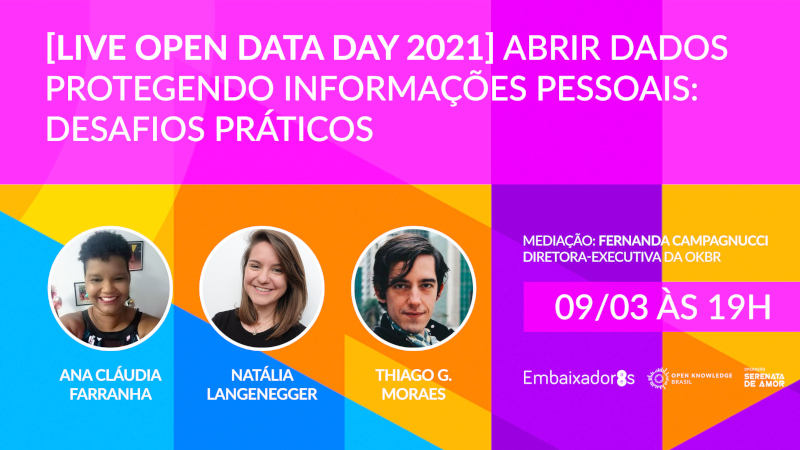
There was a workshop on using the official statistics (PNAD) to monitor youth unemployment using R, organized by Youth Voices Brasil.
Base dos Dados Mais, a civil society initiative that takes open data from several official sources and make them easier to cross-reference on Google Cloud Platform, held a datathon with the theme egalitarian development. You can read a report to see what each of the participating teams brought to the table. The winners teams were UFRJ Analytica, which analysed how access to quality education differed across different regions of Brazil, and Felipe Macedo Dias, who investigated whether or not a correlation exists in Brazilian municipalities between inflation and the total amount received as emergency social benefits. The code for the analyses are on Github.
Data-Pop Alliance made an online event “to share the results of an analysis that leveraged traditional and non-traditional data sources to estimate the conditional probability of registering domestic violence in Mexico, São Paulo and Bogotá”.
2022
For 2022, at the time of this writing, in the Open Data Day website there are two events on the map for Brazil – one from the Py013 group in Santos and the other from the UAIGeo group from UFSJ university in São João del Rei.
Are you thinking about hosting your own ODD event? Just click the button and fill the form (Google Docs) to add it to the map!
Takeaways
As with every year before, 2021 set a new record for number of Open Data Day events happening in Brazil. It’s amazing to see the community thrive with so many events everywhere, and so many people interested in open data.
2021 also marked the first time that those events in Brazil happened completely online, with no in-person events.
One noticeable trend is that almost all those events did use online tools and platforms from big tech companies and companies with not so user favorable data protection practices. That is very similar to what happened with many schools, universities, offices, etc., that had to suddenly go online in 2020 but hadn’t had the time to thoroughly review their options – to the detriment of the privacy of their users, students and collaborators. Two years later, there is no excuse anymore not to use better, free and privacy respecting online tools.
One thing I’d like to see in 2022 is to have at least a few events use free and open source software tools – which are there to use, but most people are not aware of them, or don’t care. That’s why I have taken steps to try and include some references to them in the ODD 2022 event organization guide.
Final thoughts
There have been so many Open Data Day events in Brazil in all those years that it is entirely possible, even likely, that I missed a few or them. Do you know of or have participated in an event I missed? If so, drop me an email with some evidence, preferably with links, and I’ll add it to this narrative, and of course give you credit.
Updates
2022-03-02: this article has been updated on 2022-03-02 with some information brought to my attention by David Eaves, one of the founders of the Open Data Day, to include the fact that the event has not only been present in Brazil since the beginning in 2010, but also Brazilians (Daniela Silva and Pedro Markun) were involved in its inception. I had even participated myself in the Brasília 2010 event and completely forgot about it!
Also, a reference to the 2022 OKBR blog post with advice on organizing an event has been included.